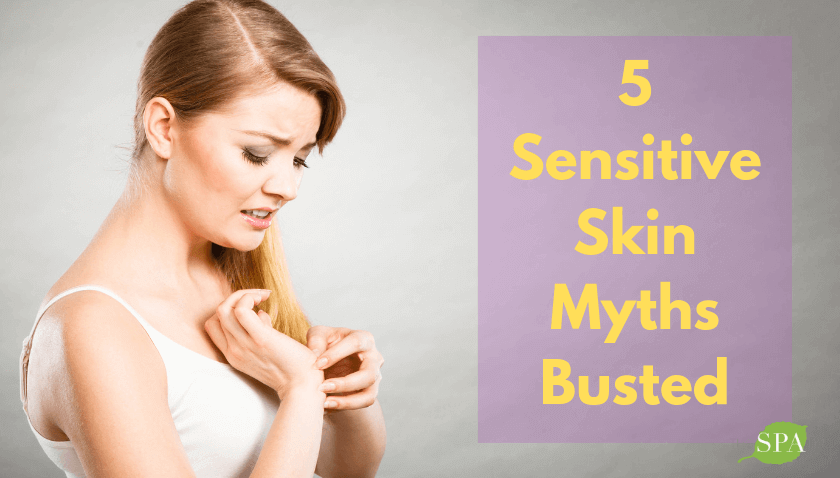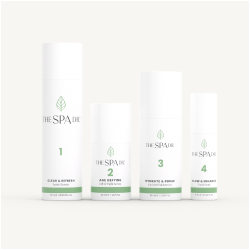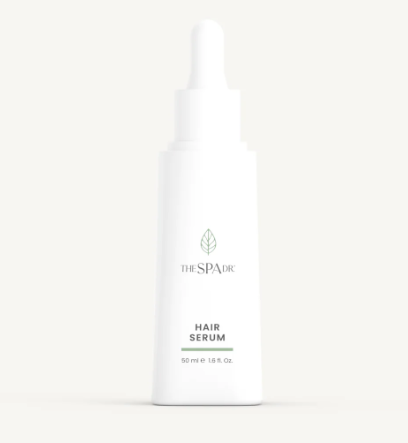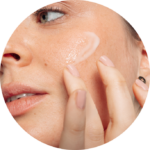If you have sensitive skin that’s easily irritated and inflamed or you struggle with red, swollen skin, then you’ve probably tried to cover it up with makeup, suppress eruptions with topicals, or have skipped essential steps in your skin care routine in an attempt to keep it clear. Keeping red and inflamed skin covered takes a lot of time and effort, and it might also be causing damage to your skin.
Heath skin types commonly experience easily flushed skin and sensitivity to skin care products. And Emmett skin types often have sensitive skin because of their tendency to allergies and eczema (atopic dermatitis).
Let’s explore common sensitive skin myths, so you can remedy discomfort, and learn how to manage and prevent it.
Myth #1: Sensitive Skin Is A Life-long Struggle.
Sensitive skin issues do NOT have to be a lifelong battle. There is always a chance to improve the condition of your skin. Addressing the root cause behind your skin problems can help you take the proper steps to heal. For example, people with sensitive skin and conditions like rosacea often have digestive problems. When the balance of your gut microflora is interrupted, the digestive tract lining becomes more permeable than it should be. As a result, food particles slip through and compromise the immune system by creating an inflammatory response. Many skin ailments are caused by inflammation, but you can alleviate these issues by naturally decreasing inflammation in the body.
Eating an anti-inflammatory and gut-healing diet is one of the most important things you can do to minimize inflammation that impacts your skin. Boost your intake of fiber-rich vegetables and include probiotic-rich foods like kimchi and sauerkraut. And eat anti-inflammatory healthy fats such as wild Alaskan salmon, avocado and olive oil, and skin-friendly spices, including turmeric, ginger, and rosemary.
Myth #2: “Hypoallergenic” Products Always Work.
You can help calm inflamed skin from the inside-out through diet, but it is also necessary to use the right skin care ingredients when you have sensitive skin. Have you purchased skin care products in the past that were labeled “hypoallergenic?” The word “hypoallergenic” actually has no regulation and is merely used for marketing, so the true meaning is lacking. Manufacturers are not required by the FDA to submit proof when making a hypoallergenic claim, and the term is not held to any standards. This can make choosing skin care products tricky for people dealing with sensitive skin. Using products labeled “hypoallergenic” does not ensure you won’t have a reaction. Many products you apply to your skin, even when labeled hypoallergenic, can increase inflammation.
Your best bet is to read the label and look for natural AND nourishing ingredients. One of my favorite skin-soothing, natural ingredients is aloe. Aloe vera keeps skin moist and plump, and it is known for its anti-inflammatory and healing properties. It is very soothing to sensitive and irritated skin. Aloe is one of the key ingredients in Step 3: Renew Enriched Moisturizer.
Myth #3: Daily Facial Cleansing Makes Your Skin More Sensitive.
Some people with sensitive skin avoid using products completely because they are afraid of exacerbating redness and discomfort. It is true that ingredients like sodium laureth sulfate and sodium laurel sulfate (detergents used in cleansers and body washes) can be irritating to sensitive skin. However, if you skip cleansing your face entirely, you are actually missing an opportunity to heal your skin because your skin is not receiving healing nutrients topically. You want to support the correct pH of your skin and improve your skin’s natural barrier.
It all starts with how you wash your face. Splashing water on your face might seem like enough, but using a gentle cleanser is essential for removing makeup and debris at the end of the day. To heal and soothe your sensitive skin, choose a cleanser that has moisturizing and nourishing ingredients and that is pH balanced to protect your skin’s natural microbiome. All of this helps calm the inflammation and restores the skin’s natural barrier function. The result: healthy skin that glows naturally without signs of sensitivity.
Myth #4: Moisturizers Cause Reactions.
Your skin needs proper hydration to support the skin’s natural barrier. When the natural lipids in the skin are compromised, it can lead to “leaky skin,” which means skin can lose its protective function and become more reactive to everything you put on it. So, you may actually be reacting to the ingredients while your skin is starving for the right nutrients.
Fragrance is in many skin moisturizers and is a common ingredient that triggers sensitive skin issues. Instead, look for fragrance-free options or moisturizers naturally scented with organic essential oils. Occasionally, people with sensitive skin negatively react to essential oils, so it’s always a good idea to do a skin patch test. To do that, place a few drops of the product onto a band-aid and place it on the skin of your inner forearm. Leave it in place for 24 hours, then remove and check for any reactions. If redness, itching, blistering or soreness has developed in the area covered by the band-aid patch, it is possible that you are sensitive to some ingredient(s) in the product and you should avoid using it.
To help soothe sensitive skin, select a moisturizer with nourishing plant-based ingredients such as Argan Oil and Turmeric. Argan Oil helps restore resilience to the skin’s barrier and provide softness, moisture, and protection to the skin. Plus, turmeric is known to have anti-inflammatory and soothing properties that relieve swelling, inflammation, and redness. Both of these ingredients, plus numerous other powerful healing properties, are in our Step 3.
Myth #5: Only Use ‘Sensitive Skin Friendly’ Products.
In my opinion, all skin care products should be made with sensitive skin in mind. Nobody should be using harsh and irritating ingredients like synthetic fragrance and formaldehyde releasers on their skin, but these are common in popular skin care products on the market today. There is a lack of regulation of irritating and even toxic ingredients.
We have many plant-based natural nourishing ingredients available today, so why choose anything that could be potentially harmful to your skin or overall health? I often hear people with sensitive skin say they choose a sensitive skin care line over a more therapeutic line to help combat signs of aging. But, my philosophy is you should be able to choose ONE skin care system that not only is ideal for sensitive skin but also helps reduce the appearance of fine lines, redness, and uneven skin tone. It is possible! Because I couldn’t find that option for my patients, I created The Spa Dr. Daily Essentials. I too have a tendency to sensitive skin and I want it to be effective, and I’m guessing you do too!
If you have been searching for solutions to healing your sensitive skin, I hope this post gives you newfound hope that you do not have to suffer with red, irritated and reactive skin. By using the right skin care products and consuming the proper nutrients, you will be able to soothe and strengthen your skin.








Reader Interactions
Thank you for this information.
I struggle with Rosacea and aging skin. I eat a healthy diet, but I am still prone to Rosacea pimples. Do you sell your productions in Canada. If so. will your products help me with my problems
Yes we can ship to Canada. And I think you will love the Daily Essentials. It’s important to use products with anti-inflammatory ingredients that nourish skin without the toxic triggers found in many skin care products.